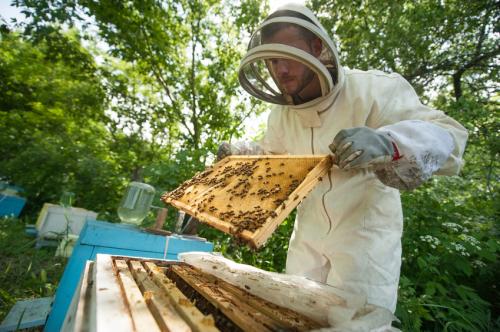

As per new FDA rules, beekeepers can get antibiotics only after they are prescribed by a veterinarian



In an effort to curb the growing threat to Antimicrobial Resistance (AMR), the US Food and Drug Administration (FDA) authority has decided to enforce new rules regarding antibiotic use in bees for honey production. Come January 2017, antibiotics will no longer be available to beekeepers over the counter.
The antibiotics used to treat common bee diseases like American and European foulbrood will be bought only with a registered veterinarian’s prescription. The veterinarian can also write a Veterinary Feed Directive (VFD), allowing purchase and use of a product. Beekeepers will need to maintain a relationship with a licensed veterinarian, get the disease diagnosed, antibiotic prescribed and buy it from a pharmacy.
The USFDA implemented a plan in 2013 to phase-out use of medically important antimicrobials in animals for food production. The plan introduced veterinary oversight for appropriate therapeutic use of antibiotics.
The beekeeping industry has been using antibiotics to control and prevent disease outbreaks and as growth promoters to increase production. Oxytetracycline, tylosin and lincomycin are the commonly used antibiotics in US beekeeping sector.
Lack of expertise, added expense and possibility of disease resurgence
The new rule will drive veterinarians to be involved in honeybee operations. Veterinary training needs to be revised after the new development.
Christopher Cripps, member of the New York Apiary Industry Advisory Committee says, "Most of the bee disease diagnosis and eradication has been done by the bee inspectors, not veterinarians. Veterinarians have not studied bees in veterinary school in the US and do not have much continuing education available."
At the same time, one needs to figure out how many vets will be required to train, and what would be the criteria for disease identification. Will vets inspect all beekeeper’s hives or just a selected few, who will train them and what will determine their professional disease management expertise in this area, he questioned.
The new rule also calls for Veterinary Client Patient Relationship, which means that the vet would be required to physically visit and examine hives on-site before prescribing a medicine. This means added expenses on the part of beekeeper in terms of paying for the veterinary visits.
With increasing costs and difficulty in accessing veterinary supervision, some beekeepers might stop medication to save time and money, which may cause disease to resurge. The situation can turn graver during pollination. The possibility of antibiotics being stocked up prior to new rules taking effect also cannot be ruled out.
It may be that FDA has also considered these issues as it comes out with the new rules. It will be interesting to see how such a policy shift, complemented by additional areas of concern, influence beekeeper and veterinary responses.
Regulations in India
In 2010, Delhi based non-profit, Centre for Science and Environment reported the presence of antibiotic residues (including multiple residues of ampicillin, enrofloxacin, erythromycin, oxytetracycline in some samples) in commercial samples of honey. Following the study, the FSSAI, in 2012, approved the recommendations of its scientific panel—antibiotics should not be used at any stage of honey production—introducing antibiotic residue standards for honey under Food Safety and Standards (Contaminants, Toxins and Residues) Amendment Regulations, 2014.
Although there are advisories and standards in place, there is a need for awareness, standard promotion and implementable measures to control on-site antibiotic use through veterinary oversight or otherwise.
We are a voice to you; you have been a support to us. Together we build journalism that is independent, credible and fearless. You can further help us by making a donation. This will mean a lot for our ability to bring you news, perspectives and analysis from the ground so that we can make change together.

Comments are moderated and will be published only after the site moderator’s approval. Please use a genuine email ID and provide your name. Selected comments may also be used in the ‘Letters’ section of the Down To Earth print edition.